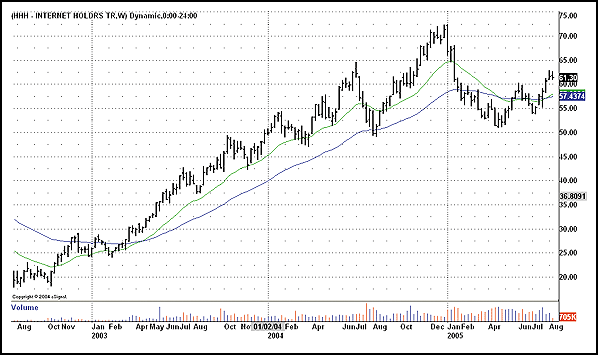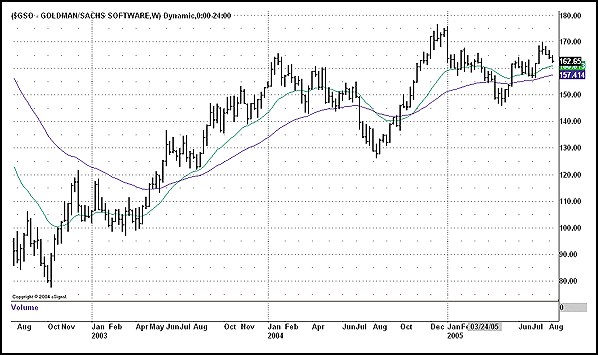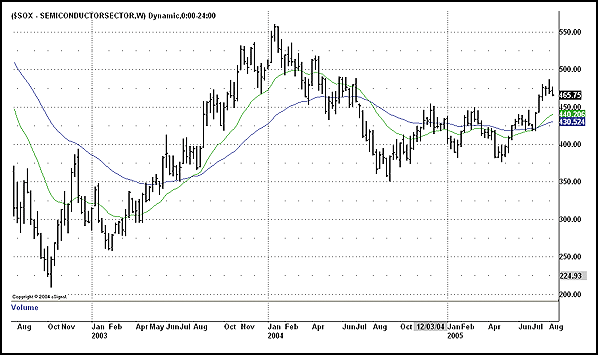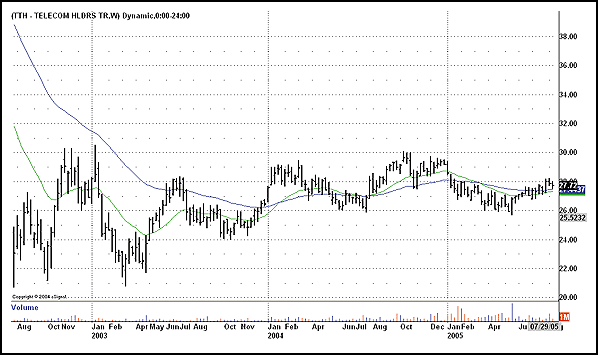iShares are an investment product from Barclay"s Global Investors, and represent among the broadest variety of exchange-traded funds (ETFS) available to institutional and retail investors alike. iShares can be bought and sold like stocks and are used by many investors instead of mutual funds in order to take advantage of the low expenses involved in trading ETFS.
INTERNET HOLDERS TRUST (HHH)

The Internet HOLDRS trust is an exchange-traded product that allows individual investors to diversify their market exposure on a sector-for-sector basis. Unlike traditional exchange-traded funds, HOLDRS owners have real ownership rights to the underlying stocks within the trust. Lower costs and tax advantages are among the reasons investors have begun adding HOLDRS to their portfolios.
Our three-year window in Intermarket Review finds HHH trading off its high in late 2004 after a two-year bull market that began in earnest when HHH's 20-week moving average crossed above its 50-week moving average in spring 2003. Save for a sharp correction in summer 2004, HHH's bull market over the past few years has been all but flawless, with no major weekly low being taken out - even up to trading in recent months.
What they say: "I can imagine eBay's Meg Whitman (as polished as she is) spitting out the word 'Google' like Jerry Seinfeld and George Constanza snarling 'Newman' through gritted teeth. And, with verb envy she may have cried out to her executives in past meetings: 'Why doesn't the public say, "Hey, did you eBay your car today?" Google's a verb. Why aren't we? That's our problem. We need a verb! Everyone - find me a verb to buy!'
"Enter Skype, the Voip startup that's adding 150,000 users a day, has up to 54 million registered users in 225 countries, and apparently is a verb these days, according to Niklas Zennstrom, Skype's co-founder and CEO. Frankly, I never heard anyone say: 'I Skyped someone today.'
"Nonetheless, eBay's got its verb, and a hot commodity that'll market itself, thanks to the press and blogs." - Bambi Francisco, "The Things Google Makes You Do," CBS MarketWatch, September 22, 2005.
GSTI SOFTWARE INDEX ($GSO)

The GSTI Software Index, or $GSO, is an index of 45 computer software makers and distributors. Companies include some well-known names in the industry such as Adobe Systems, Electronic Arts, Microsoft, Oracle, and Hyperion Solutions.
A three-year look at the major software stocks shows how investors in these stocks have been well rewarded. Bottoming in late 2002, the software index began moving up early in 2003, but it was not until summer that the 20-week exponential moving average (EMA) crossed above the 50-week EMA. This signaled further gains as the $GSO continued to advance until the beginning of 2004. The bear market in the first half of 2004 saw $GSO take out two previous weekly lows in early 2004 and late 2003 as the index slipped below its 20- and 50-week EMAs. However, software stocks rebounded with the rest of the market in the second half of 2004 and went on to make a new high late that year. $GSO again slipped below both moving averages during a correction in early 2005, but by late summer the index had regained enough ground to consistently close above both the 20- and 50-week EMAs.
What they say: "Windows Vista ... is not expected to reach general market release until the second half of 2006. But many very interested spectators have [been] lining up for beta copies of the latest version of Windows. 'This beta is going to focus on security,' said Mr. Williams. 'A lot of the other stuff that they've tried to do has gotten shifted aside in favor of security. Security is now the key thing.' Will Microsoft detail its antivirus and spyware plans for Windows Vista? Symantec and McAfee have to be very interested. Their futures could depend on what Microsoft does with Vista." - "Vista Beta Expected," Red Herring, July 27, 2005.
PHILADELPHIA STOCK EXCHANGE SEMICONDUCTOR INDEX ($SOX)

The Philadelphia Stock Exchange's Semiconductor Index ($SOX) has been a leading barometer of the market for technology stocks for years. The index consists of 19 stocks representing some prominent corporations in the semiconductor industry.
The $SOX has sent semiconductor investors on a wild ride since the bear market bottom late in 2002. The $SOX rallied strongly through 2003, with its 20-week exponential moving average (EMA) moving above its 50-week EMA in the summer of that year. Peaking late in 2003, the $SOX fell sharply during the first three quarters of 2004, taking out numerous lows in the process. Its correction coming to a halt in summer 2004, the semiconductor index slipped into a trading range over the next several months before appearing to break out to the upside in summer 2005.
What they say: "Be careful of what you wish for. After Intel spent billions over [the] past decade to make its brands one of the best known in the world, it's beginning to look like there's no place the giant chipmaker can escape scrutiny. The ... company disclosed in a regulatory filing on August 8 that the South Korean Fair Trade Commission is looking into its rebate and marketing practices, joining similar investigations in Japan and the European Commission. Investigators ... are probing claims that Intel has abused its dominant market share in microprocessors to force customers into exclusive contracts that may have illegally shut out rival Advanced Micro Devices." - Cliff Edwards, "A World Of Probes Into Intel," BusinessWeek, August 10, 2005.
TELECOMMUNICATIONS HOLDRS TRUST (TTH)

The telecommunications HOLDRS trust is an exchange-traded product that allows individual investors to diversify their market exposure on a sector-for-sector basis. Unlike traditional exchange-traded funds, HOLDRS owners have real ownership rights to the underlying stocks within the trust. Lower costs and tax advantages are among the reasons short- and long-term investors have begun adding HOLDRS to their portfolios.
In many respects, the telecommunications HOLDRS never recovered from the bear market lows of late 2002. Trading in a 10-point range in late 2002 as the HOLDRS bounced and failed, Tth moved into a tighter range over 2003 and 2004. By summer 2004, the range had tightened from 10 points to four. But a ceiling at the $30 level remained and, as of this writing, remains impenetrable. Moving into 2005, that four-point range had tightened into a two-point range.
What they say: "The Texas House of Representatives this morning passed a bill that would make it easier for SBC Communications Inc. and Verizon Communications Inc. to offer pay television in the state. Lawmakers had twice debated the measure, which lets the big phone companies negotiate a single statewide franchise to compete with the cable industry in the video business. Legislators, mired in a contentious debate over school finance and tax issues, were unsuccessful in passing two earlier proposals." - Sanford Nowlin, "House Passes Telecom Bill," San Antonio Express-News, August 10, 2005.
Excerpted from an article originally published in the November 2005 issue of Technical Analysis of STOCKS & COMMODITIES magazine. All rights reserved. © Copyright 2005, Technical Analysis, Inc.
Return to November 2005 Contents